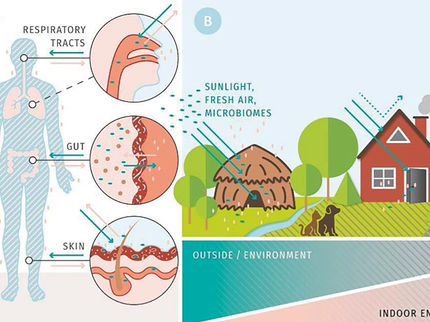When dogs and cats make children ill
The Children's Health Foundation provides information about fungal infections caused by animals and other zoonoses
Advertisement
cats, dogs, hamsters, guinea pigs and rabbits are part of the family for many children. For city children, these pets are often an important link to living nature, reports the Stiftung Kindergesundheit (Children's health Foundation): interacting with animals increases their zest for life, promotes a sense of responsibility and generally also has a positive effect on the health and well-being of their young and older caregivers.
However, contact with beloved pets also harbors potential dangers, the Munich-based foundation points out: animals can bite and carry dirt and germs from outside into the home. There are also a number of infections with bacteria, viruses or parasites that can be transmitted from animals to humans. Such diseases are known as zoonoses. Children under the age of twelve are most frequently affected, but in principle anyone can contract a disease from a pet.
So lovely, but unfortunately contagious
Pets can also transmit skin fungi, parasites that can cause inflammatory skin changes, when stroked and cuddled. The tricky thing is that the animals can harbor the pathogens in their fur without showing any symptoms themselves.
The most common diseases caused by skin fungi (dermatophytes) include inflammatory changes to the scalp. These fungal infections (medically: mycoses) occur particularly in children between the ages of 3 and 9, while adults and infants are less frequently affected. Infections mainly affect the hairy head, but sometimes also the hands and forearms, neck and face.
The skin fungi are transmitted by spores, tiny particles that are invisible to the naked eye. They can come from a dog or a cat and are mainly found on the hairy head, but sometimes also on the hands and forearms, neck and face. The flakes of skin and hair infested with spores are infectious and can also transmit the fungal disease from animals to humans.
The spores settle in the skin and feed on keratin, a protein contained in the upper layer of the skin and in the hair.
Bald patches on the scalp
Particularly dreaded is the "ringworm" of the scalp caused by certain skin fungi, medically known as "tinea capitis". One or more circular bald patches with pink to reddish colored, scaly and itchy skin form on the hairy scalp. Sometimes painful cracks also develop.
The typical signs of tinea capitis are the roundish, often sharply defined, scaly areas on the scalp, on which the hair is missing or very thin. In the case of a prolonged or purulent inflammatory reaction, permanent scars can also develop after healing.
The contagious disease often affects entire kindergartens and nurseries, children's homes or school classes. In such cases, the public health department must be informed immediately, emphasizes the Stiftung Kindergesundheit.
If a child is infected with a skin fungus, it often affects other members of the family too: the pathogen is also transmitted from person to person and from person to animal.
Increase due to the Covid-19 pandemic
According to the Children's Health Foundation, there has recently been a sharp increase in cases of fungal skin infections. The current increase is apparently also partly due to the popularity of barbershops among young people, where hygiene conditions are inadequate in some cases.
However, the recent COVID-19 pandemic also caused the number of children infected with skin fungi to skyrocket, as significantly more pets were bought and kept in families during the pandemic.
Treatment often takes months!
There are several medications (antifungals) that are effective against fungal infections. They can be applied directly to a fungal infection of the skin or another part of the body (e.g. mouth or genitals). Antifungals can also be taken orally or injected if a more serious infection needs to be treated.
As fungi can be very stubborn creatures, treatment for severe fungal infections often takes several months. The pet affected by the fungal infection should also be treated accordingly.
Important: Don't forget to wash your hands!
Prevention is also important: If children have been playing outdoors, they should wash their hands afterwards. The same applies if they have spent time with a pet or cleaned its sleeping area or cage. Pets should also be looked after regularly by a vet.
Skin fungi transmitted by animals can be treated well in most cases, emphasizes Stiftung Kindergesundheit. Fear of a fungal infection should therefore not be a reason to decide against getting a pet.
Note: This article has been translated using a computer system without human intervention. LUMITOS offers these automatic translations to present a wider range of current news. Since this article has been translated with automatic translation, it is possible that it contains errors in vocabulary, syntax or grammar. The original article in German can be found here.

























































